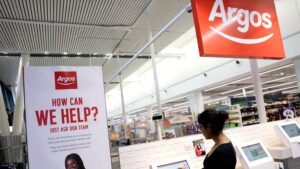CrowdStrike IT outage devastating for businesses – but some got off more lightly than others
Speaking on NBC, CrowdStrike chief executive George Kurtz apologised, saying the cyber security firm was “deeply sorry for the impact that we’ve caused to customers, to travellers, to anyone affected by this, including our companies”.

The CrowdStrike IT outage has been devastating for commerce, healthcare and transport because it was entirely agnostic in the services it affected.
This was not a sector or function-specific glitch, like the unconnected interruption to CHAPS transactions overseen by the Bank of England the previous evening.
To have a problem, irrespective of where you were in the world or the industry you were in, all you needed was to be running devices on a Microsoft network with CrowdStrike protection.
Follow live: CrowdStrike rules out cyber attack as world copes with tech ‘disaster’
Its power to disrupt lay in the functionality that made it so popular in providing security for the systems it has ended up corrupting.
CrowdStrike focuses on protecting ‘endpoints’, the devices connected to a network, with around a quarter of the security market, that amounts to hundreds of millions of computers individually affected.
That made the impact unpredictable but broad and thankfully, in most cases, inconvenient and disruptive rather than catastrophic.
At airports, Ryanair could not access its automated check-in vehicle, but easyJet could.
Retailers like Morrisons and Waitrose found themselves unable to process card payments while others carried on.
And Sky News was unable to broadcast on live television for a number of hours while BBC News, which uses the same editorial software system, was uninterrupted.
👉 Click to subscribe to the Sky News Daily wherever you get your podcasts 👈
Transport has clearly been the worst hit.
With security an absolute priority, airlines and airports had little choice but to ground and cancel flights when check-in systems were inaccessible.
The problems passed around the globe as the software update hit and systems were switched on, from Australia through Europe to the US.
British railways warned of potential disruption, with 14 operating companies affected.
In practice, it appears to have been limited to customer information on departure boards, with more familiar and entirely unconnected signal problems causing far greater delays on some routes.
Banks appear to have got off lightly.
Barclays confirmed that one of its services, Smart Investor, was affected but the other main high street lenders said their branches and payments systems were working normally.
Read more from Sky News:
Serious questions to answer after ‘biggest IT outage in history’
IT outage fixes ‘could still take some time’
What we know about the IT outage
What matters now is how long it takes to fix, how to avoid a repeat, and what recourse businesses have to recoup losses from CrowdStrike.
The company says a fix is under way but there are warnings it will take a machine-by-machine reboot to get devices back on to networks.

Keep up with all the latest news from the UK and around the world by following Sky News
Be the first to get Breaking News
Install the Sky News app for free


CrowdStrike and Microsoft are already facing questions about how this could have happened, and whether a lack of competition in an industry dominated by behemoths caused a small error to become a universal problem.
Any corporate lawyers meanwhile, who could get their computers to start up, may be considering seeking compensation for an incident that will have cost companies millions, perhaps billions, in lost revenue and disruption.
For now they, and we, will have to make do with the thought that it could have been worse.


